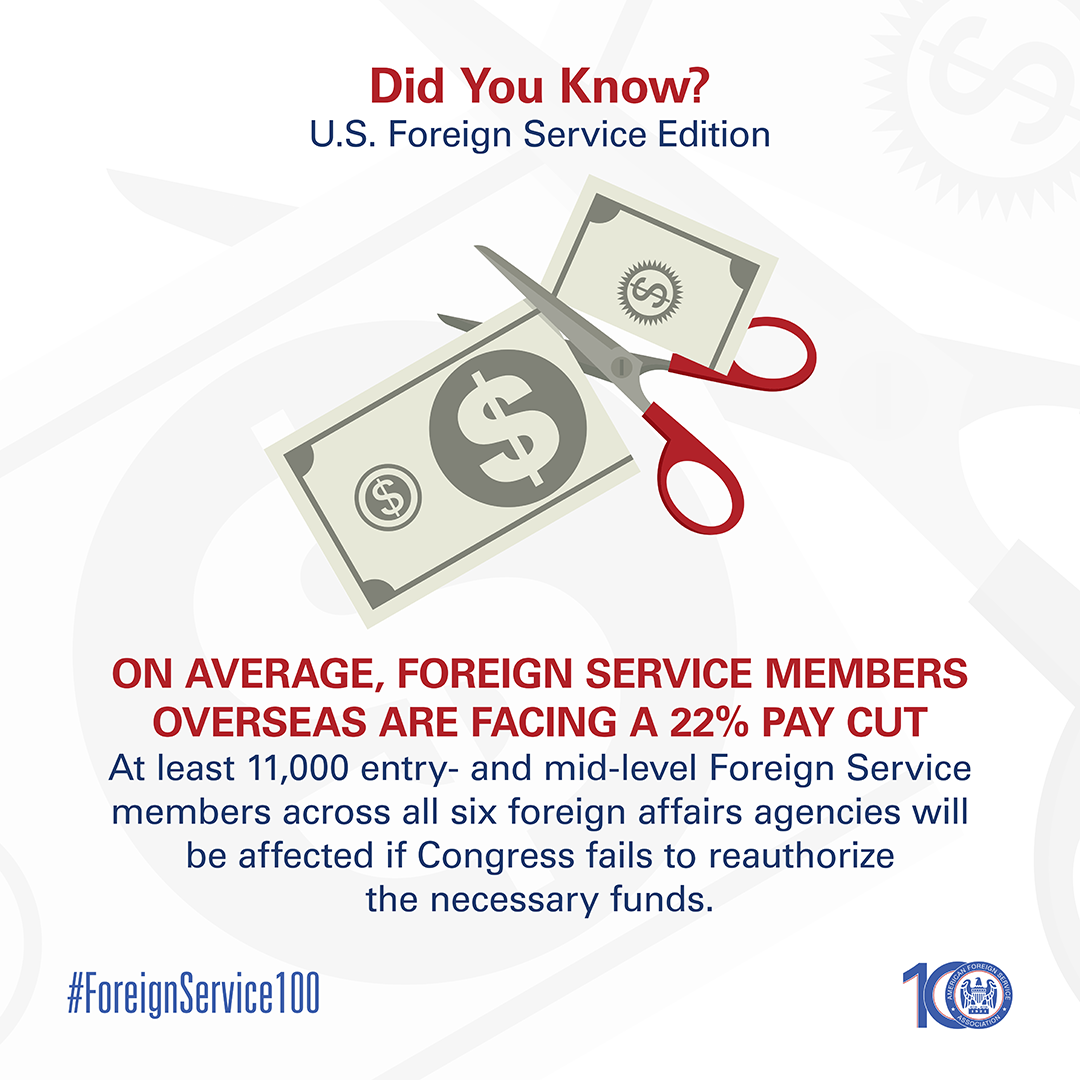Overseas Comparability Pay
Last Updated 9/23/24
The House of Representatives has included an extension of Overseas Comparability Pay (OCP) authority in its Continuing Resolution (CR), which, if passed, will extend OCP through December 20, 2024. This critical development is a positive step toward ensuring no interruption in OCP for Foreign Service members overseas. AFSA anticipates that the National Defense Authorization Act (NDAA), expected to pass by December 21, 2024, will further extend OCP authority through September 30, 2026. Should this not happen via the NDAA, AFSA expects Congress to act through another legislative vehicle before the new deadline.
JOIN THE FIGHT
AFSA is calling on Congress to take action and prevent OCP from lapsing. Join our effort by sharing our infographic with your networks to help us protect the pay of our Foreign Service members and their families.
What is Overseas Comparability Pay?
Overseas Comparability Pay (OCP) was introduced in 2009 to address a pay gap between Foreign Service employees serving abroad and their counterparts stationed in Washington D.C. OCP provides an average salary adjustment of 22% for Foreign Service members at the entry and mid-level, helping bring more equitable compensation to employees posted overseas.
OCP is designed to correct an anomaly in the Federal Pay Comparability Act of 1990, which excluded federal employees posted outside the continental United States from receiving locality pay adjustments. As a result, Foreign Service personnel, who spend approximately 60% of their careers abroad, were receiving lower pay than their Civil Service or agency colleagues performing similar functions exclusively within the U.S. OCP helps to ensure federal employees posted overseas are on an equal footing salary-wise with their Washington D.C. counterparts. Currently, Foreign Service employees overseas receive comparability pay amounts to approximately two-thirds of what their Washington-based colleagues receive.
This adjustment applies to employees grades FS-01 through FS-09 at the State Department, USAID, Foreign Commercial Service (FCS), Foreign Agricultural Service (FAS), Animal and Plant Health Inspection Service (APHIS), and the U.S. Agency for Global Media (USAGM), as well as federal employees from other agencies working long-term abroad.
OCP Resources
- OCP Lapse Impact Stories: Read personal stories from AFSA members on how a potential OCP lapse could affect their lives.
- OCP Infographic: for sharing on social media.
FAQ
Q: What is Locality Pay?
A: Locality Pay is a pay adjustment intended to bring base salaries of federal employees closer to the level of salaries paid in the private sector for comparable work in specific labor markets. It is not a cost-of-living adjustment or incentive pay. All federal employees serving in the continental United States receive some level of locality pay based on figures compiled by the Congressional Budget Office (CBO).
Locality pay varies by location, with fifty-eight localities having specific levels of comparability payments, and other jurisdictions having a “rest of U.S” rate of 16.82%. Some examples of the fifty-eight localities include:
- Reno, NV: 17.11%
- San Francisco: 45.41%
- Washington D.C.: 33.26%
Q: Why do federal employees stationed overseas not receive locality pay?
A: The Federal Pay Comparability Act (FEPCA) of 1990 established locality pay to achieve salary comparability within the United States but inadvertently excluded federal employees stationed outside the continental U.S. from receiving these adjustments. As a result, Foreign Service personnel who spend about two-thirds of their careers abroad received less salary compared to their Civil Service colleagues who perform similar functions within the U.S.
Q: Do Civil Service employees on Temporary Duty (TDY) overseas receive locality pay?
A: Yes, Civil Service employees on TDY assignments overseas retain the locality pay designated for their domestic assignment. However, this pay is not permanent even if TDY assignments last a year or longer. Employees on TDY can also receive differential and cost-of-living adjustments for the post of assignment and in some cases, per diem. In contrast, Civil Service employees on long-term or permanent overseas assignments do not receive locality pay.
Q: How do post differentials and allowances compare to OCP?
A: Post differentials and allowances are not equivalent to OCP. Most cost-of-living allowances and differentials, such as hardship and danger pay, were created before FEPCA. These are temporary and tied to the specific assignment location. In contrast, Overseas Comparability Pay (OCP) is a permanent component of base pay and is not related to the specific post of assignment, working conditions, or cost of living. OCP aims to partially close the gap between public and private sector salaries for comparable-level work, providing a more equitable compensation structure for employees stationed abroad.

